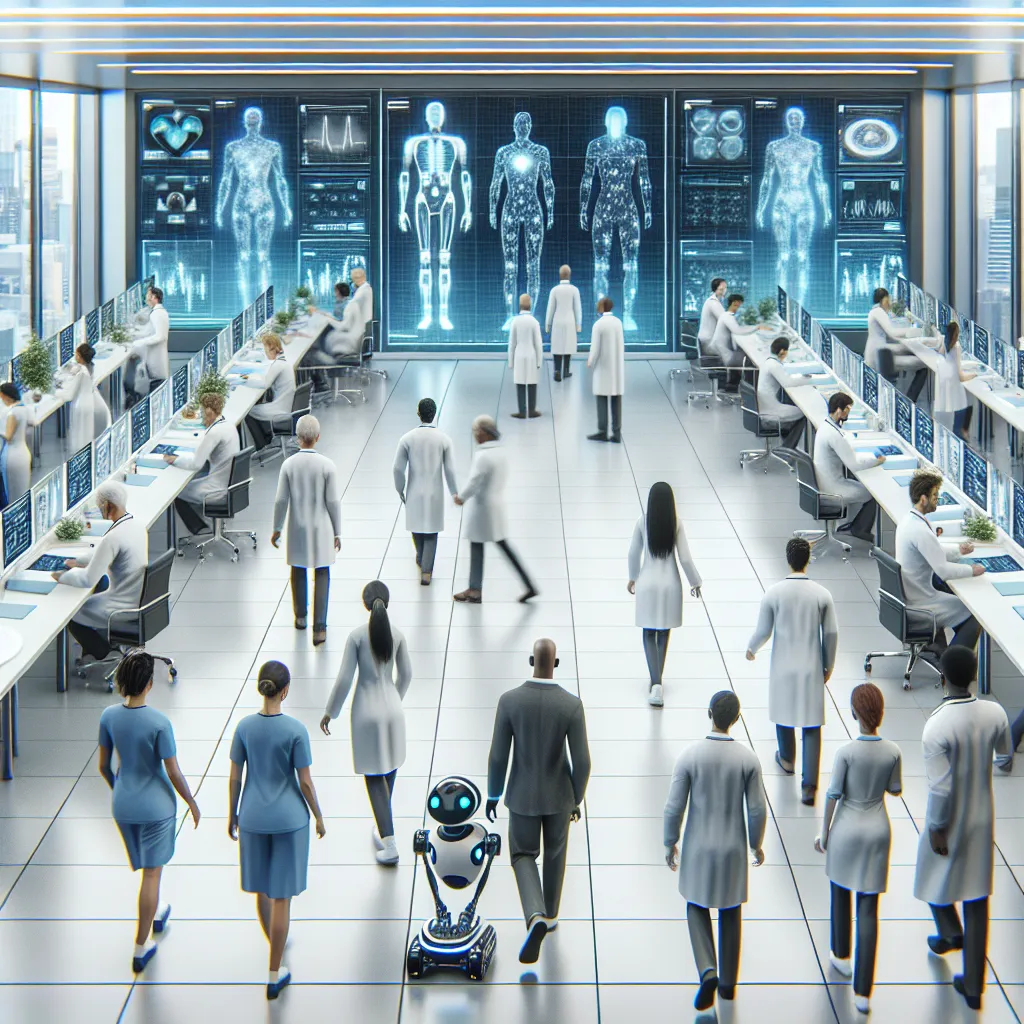Artificial Intelligence (AI) in healthcare is a rapidly evolving topic that has been gaining attention in recent IELTS exams. Based on the analysis of past exam questions and current trends, it is highly likely that this subject will continue to appear in future IELTS Writing Task 2 prompts. Let’s explore a relevant question that reflects this theme:
Some people believe that artificial intelligence will revolutionize healthcare delivery, while others are concerned about potential risks. Discuss both views and give your own opinion.
Analyzing the Question
This question addresses the impact of AI on healthcare delivery, requiring candidates to:
- Discuss the positive aspects of AI in healthcare
- Explore potential risks or concerns
- Provide a personal opinion on the topic
Sample Essay
Here’s a model essay that addresses the given prompt:
Artificial Intelligence (AI) has emerged as a groundbreaking technology with the potential to transform various sectors, including healthcare. While some individuals are enthusiastic about AI’s capacity to revolutionize medical services, others express apprehension regarding possible risks. This essay will examine both perspectives before presenting my own viewpoint.
Proponents of AI in healthcare argue that it can significantly improve patient care and medical outcomes. AI-powered systems can analyze vast amounts of medical data more quickly and accurately than human professionals, enabling faster and more precise diagnoses. For instance, AI algorithms can detect early signs of diseases like cancer in medical images, potentially saving lives through early intervention. Moreover, AI can enhance treatment planning by identifying optimal therapies based on a patient’s genetic profile and medical history, leading to more personalized and effective care.
On the other hand, skeptics raise valid concerns about the integration of AI in healthcare. One primary worry is the potential for errors in AI systems, which could lead to misdiagnoses or inappropriate treatments, potentially harming patients. Additionally, there are ethical concerns regarding data privacy and security, as AI requires access to sensitive medical information. Critics also fear that over-reliance on AI might lead to a dehumanization of healthcare, reducing the crucial human touch and empathy in doctor-patient relationships.
In my opinion, while the concerns surrounding AI in healthcare are legitimate, the potential benefits far outweigh the risks. I believe that AI should be viewed as a powerful tool to augment human expertise rather than replace it entirely. By combining AI’s analytical capabilities with human judgment and empathy, we can create a more efficient and effective healthcare system. However, it is crucial to implement robust safeguards and regulations to address privacy concerns and ensure the responsible development and deployment of AI in medical settings.
In conclusion, AI has the potential to revolutionize healthcare delivery by improving diagnostics, treatment planning, and overall patient care. While concerns about risks are valid, I believe that with proper oversight and a balanced approach, AI can significantly enhance the quality and accessibility of healthcare services worldwide.
(Word count: 329)

Writing Tips
When addressing this topic, consider the following:
- Balanced argument: Ensure you discuss both positive and negative aspects of AI in healthcare.
- Specific examples: Use concrete examples to illustrate your points, such as AI applications in medical imaging or personalized treatment planning.
- Technical vocabulary: Incorporate relevant healthcare and technology terms to demonstrate your knowledge of the subject.
- Clear structure: Organize your essay with a clear introduction, body paragraphs for each viewpoint, and a conclusion that summarizes your opinion.
- Cohesive devices: Use linking words and phrases to connect ideas and ensure a smooth flow of your argument.
Key Vocabulary
Here are some essential terms related to AI in healthcare:
-
Artificial Intelligence (AI) (noun) /ˌɑːrtɪˈfɪʃl ɪnˈtelɪdʒəns/: The simulation of human intelligence in machines.
-
Machine Learning (noun) /məˈʃiːn ˈlɜːrnɪŋ/: A subset of AI that enables systems to learn and improve from experience.
-
Diagnostics (noun) /ˌdaɪəɡˈnɒstɪks/: The process of identifying diseases or medical conditions.
-
Personalized medicine (noun) /ˈpɜːrsənəlaɪzd ˈmedɪsn/: Medical care tailored to an individual’s genetic profile and characteristics.
-
Data privacy (noun) /ˈdeɪtə ˈprɪvəsi/: The protection of personal information from unauthorized access or use.
-
Algorithm (noun) /ˈælɡərɪðəm/: A set of rules or instructions followed by a computer to solve a problem or perform a task.
-
Telemedicine (noun) /ˌtelɪˈmedɪsn/: The remote diagnosis and treatment of patients using telecommunications technology.
-
Robotics (noun) /roʊˈbɒtɪks/: The branch of technology that deals with the design and operation of robots.
-
Ethical implications (noun) /ˈeθɪkl ˌɪmplɪˈkeɪʃnz/: The moral consequences or considerations of a particular action or technology.
-
Interoperability (noun) /ˌɪntərˌɒpərəˈbɪləti/: The ability of different systems or components to work together and share information.
Conclusion
The topic of AI in healthcare is likely to remain relevant in IELTS Writing Task 2 exams. To prepare effectively, practice writing essays on related themes such as:
- The impact of AI on medical research and drug discovery
- Ethical considerations in AI-assisted medical decision-making
- The role of AI in addressing global health disparities
- Balancing technological advancements with human-centered care in healthcare
By familiarizing yourself with these topics and developing a strong vocabulary related to healthcare and technology, you’ll be well-equipped to tackle any AI-related question in your IELTS Writing Task 2.
For more information on related topics, you may find these articles helpful: